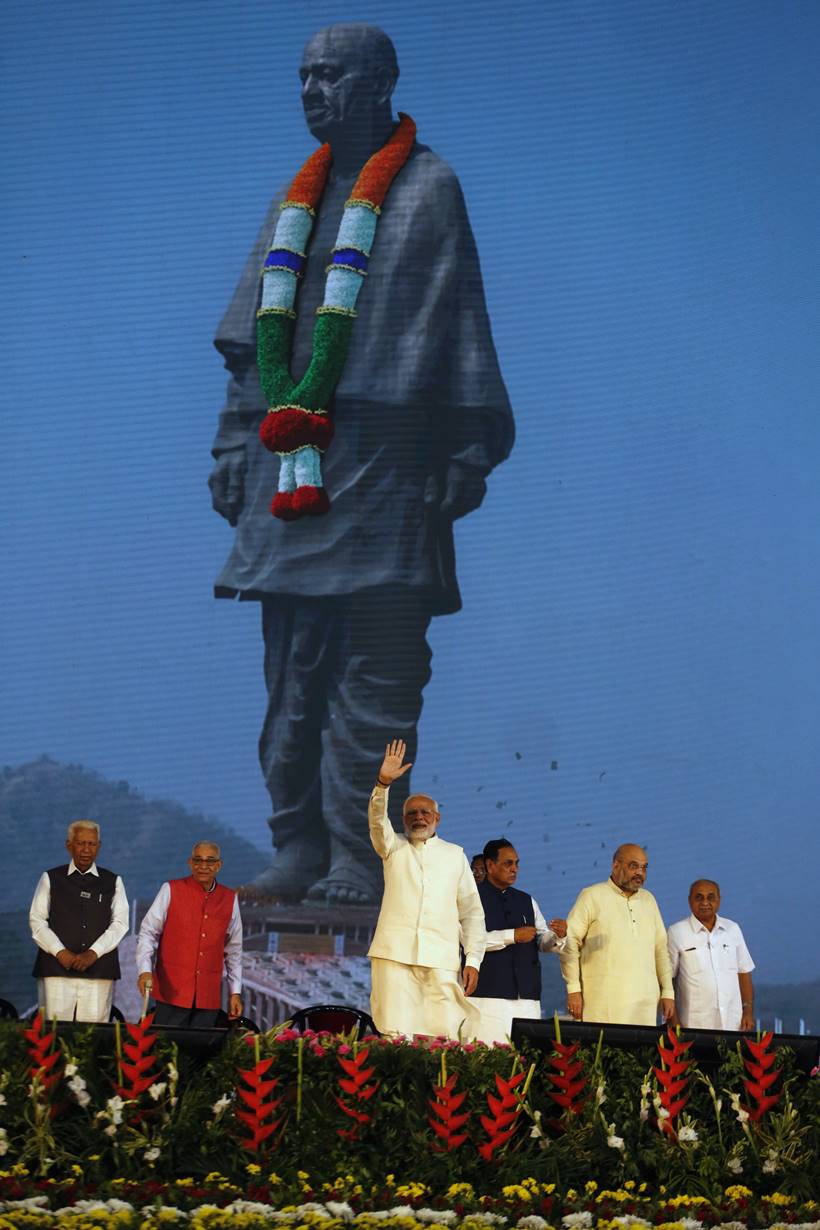


Prime Minister Narendra Modi attended the Rashtriya Ekta Diwas in Gujarat and hailed the abrogation of Article 370 in Jammu and Kashmir, along with the new Chief Minister taking oath on the Constitution. He also highlighted the importance of implementing Babasaheb Ambedkar's Constitution across the country. Addressing issues of militancy in North-East India, Modi stated that peace and development have been achieved through dialogue and trust, emphasizing recent agreements and ending unrest in the region.
Narendra Modi and the Indian Constitution: Strengthening Unity and Integralism
Prime Minister Narendra Modi has been a vocal proponent of the Indian Constitution, emphasizing its role in upholding the nation's unity and territorial integrity. His recent statements at the Rashtriya Ekta Diwas (National Unity Day) in Gujarat underscore his commitment to preserving and strengthening the fundamental principles of the country's founding document.
Abrogation of Article 370 and Integration of Jammu and Kashmir
In his address, Modi hailed the abrogation of Article 370 of the Indian Constitution, which had granted special status to the state of Jammu and Kashmir. This move, he argued, was necessary to fully integrate Jammu and Kashmir with the rest of India and promote its development and security. The abrogation was met with mixed reactions, with some opposing it as a violation of the state's autonomy.
Swearing-in Ceremony on the Constitution
Modi also highlighted the significance of the recent swearing-in ceremony of the new Chief Minister of Jammu and Kashmir, who took oath on the Indian Constitution. This, he said, symbolized the state's full commitment to the rule of law and the principles of the Indian Union.
Babasaheb Ambedkar and the Importance of the Constitution
Modi emphasized the need to implement Babasaheb Ambedkar's vision for the Indian Constitution, which he described as a "living document" that should guide the nation's governance and social progress. Ambedkar, the chief architect of the Constitution, envisioned a society based on equality, justice, and fraternity.
Addressing Militancy in North-East India
Modi addressed the issue of militancy in North-East India, highlighting the success of the government's efforts to bring peace and development to the region through dialogue and trust. He cited recent agreements with insurgent groups as evidence of the region's progress towards stability and normalcy.
Top 5 FAQs and Answers on Modi and the Constitution
1. Why did Modi hail the abrogation of Article 370?
Modi believes that abrogating Article 370 was necessary to fully integrate Jammu and Kashmir with the rest of India, promote its development, and enhance its security.
2. What was the significance of the Chief Minister taking oath on the Constitution?
The Chief Minister's oath on the Constitution symbolizes Jammu and Kashmir's full commitment to the rule of law and the principles of the Indian Union.
3. What is Babasaheb Ambedkar's vision for the Constitution?
Ambedkar envisioned the Constitution as a "living document" that should guide India's governance and social progress, promoting equality, justice, and fraternity.
4. How has the government addressed militancy in North-East India?
Through dialogue, trust-building, and recent agreements with insurgent groups, the government has brought peace and development to North-East India, ending unrest and promoting stability.
5. What is Modi's overall commitment to the Constitution?
Modi is a staunch supporter of the Indian Constitution and believes it is essential for preserving the nation's unity, promoting progress, and ensuring the rights of all citizens.

Activists and advocacy groups staged massive demonstrations across the country in response to what they see as President Trump's abuse of power. With signs protesting policies such as mass deportations and the federal government shutdown, protestors showed a fierce love for their country. Though there were no reports of violence or arrests, Republicans labeled the demonstrations as "hate America" rallies. Organizers estimate that nearly 7 million people participated in over 2,700 cities and towns throughout the U.S., making it one of the largest reported one-day protests in American history.

With the 2025 Assembly Elections in Bihar on the horizon, the state's Araria constituency is gearing up for an intense revision of its electoral roll. This decision by the Election Commission aims to ensure that all eligible citizens are registered to vote in the upcoming elections. In the last election, the Congress emerged victorious in the constituency, but with no candidates declared yet, all eyes are on the official schedule for the 2025 Bihar Assembly Elections.

The Bharatiya Janata Party (BJP) in Andhra Pradesh marked Dhanvantari Jayanti with a colorful rally and speeches highlighting social inclusion, cultural heritage, and development. Leading state and district leaders, including BJP State president PVN Madhav, addressed the gathering and emphasized the party's commitment to equal respect for all religions and welfare initiatives for marginalized groups. At another event, Telangana BJP president Ramachandra Rao endorsed a proposed reservation for backward classes in Telangana and criticized the Congress and other parties for corruption while touting BJP's claim of clean governance.

Defence Minister Rajnath Singh, while flagging off the first batch of BrahMos missiles in Lucknow, warned Pakistan that their entire territory is now within range of India's powerful missiles. Singh also highlighted the success of Operation Sindoor, stating that it was just a glimpse of India's growing capabilities. The minister emphasized that BrahMos serves as a symbol of India's strategic confidence and is a key pillar of the country's defence forces.

Crowds gathered in various cities across the US and overseas today for the No Kings rallies, organized to protest against President Trump's administration and to defend First Amendment rights. From Los Angeles and New York to Chicago, Washington D.C, and Austin, Texas, protesters marched and chanted, carrying homemade signs with messages such as "We want all of the government to work" and "Make America Good Again." Despite the festive atmosphere, the message was serious as speakers called for the protection of Constitutional rights, which they feel are being threatened by the current administration.

After issuing directions earlier this year to expedite the disposal of execution petitions, the Supreme Court has expressed disappointment over the fact that more than 8.8 lakh such petitions are still pending across the country. Despite disposing of 3.38 lakh petitions since March, the Court notes that the backlog is still concerning. It warns that delay in executing decrees could result in travesty of justice and directs the Karnataka High Court to provide an explanation for not submitting data on pending cases.

With election results just around the corner, the Union Home Minister has reiterated the BJP's respect for its alliance partners. The decision on forming a government in light of the election outcome will be based on the results and mutually agreed upon by all parties involved. Stay updated with News24 for the latest developments in the political sphere.

In a surprise move, President Donald Trump has commuted the sentence of former U.S. Representative George Santos, who was serving a seven-year prison term for fraud and identity theft. Santos, a New York Republican, admitted to deceiving donors and stealing the identities of 11 people, including family members, to fund his campaign. The decision was announced by Trump on social media, spurring strong reactions from both supporters and critics.

In a significant development, Defence Minister Rajnath Singh inaugurated Hindustan Aeronautics Limited's third production line for the LCA Tejas Mk1A and also witnessed the aircraft's successful maiden flight in Nashik. The event also marked the inauguration of HAL's second production line for the Hindustan Turbo Trainer-40 (HTT-40). With the approval of the purchase of 97 LCA Mark 1A fighter jets, the need for new inductions has been underlined by IAF chief AP Singh, while HAL officials remain confident in meeting this requirement.

In a significant development, over 200 Maoist rebels, including top leaders Rupesh and Ranita, have surrendered to Indian security forces in the Bastar region of Chhattisgarh. This marks a critical moment in the long-standing fight against Naxalism in the country. The region of Abujhmarh and North Bastar, known for its dense forests and difficult terrain, has historically served as a safe haven for Maoist groups, making it challenging for authorities to root out their presence. The massive surrender of Maoists is not only a tactical win but also a symbolic victory in the government's efforts to rid the "Red Corridor" of Naxalite influence.